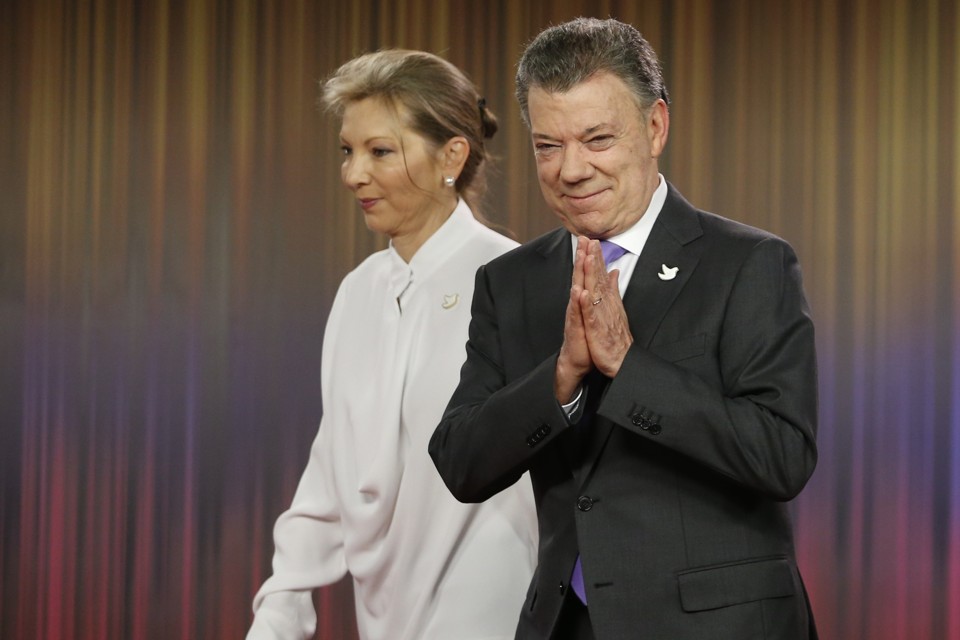
What Should the Nobel Peace Prize Recognize?
The 2016 award to
Colombia’s Juan Manuel Santos for his efforts to end the decades-long
conflict with FARC arguably breaks a string of more symbolic
recognitions.
The Atlantic | 7 October 2016
The Nobel Committee’s decision
to award the 2016 Peace Prize to Juan Manuel Santos is a gamble of sorts, a bet
on a peace process that is troubled and still incomplete. But that gamble also
represents a return to a different sort of award for the committee. After a
string of winners notable for their admirable heroism, the committee has chosen
to grant an award recognizing a major effort toward resolving a specific
conflict.
The committee praised Santos
“for his resolute efforts to bring the country’s more than 50-year-long civil
war to an end, a war that has cost the lives of at least 220,000 Colombians and
displaced close to six million people. The award should also be seen as a
tribute to the Colombian people who, despite great hardships and abuses, have
not given up hope of a just peace, and to all the parties who have contributed
to the peace process.”
It also
acknowledged that the peace in Colombia is a work in progress: “The fact that a
majority of the voters said no to the peace accord does not necessarily mean
that the peace process is dead.” In a positive sign, the leader of the
Revolutionary Armed Forces of Colombia (FARC) congratulated Santos as
negotiations continued in Cuba.
Many of the most memorable
prizes have gone to people working to resolve intractable, decades-long conflicts,
and many of them have been controversial gambles. Take the 1973 award to Henry
Kissinger and Le Duc Tho. On the one hand, the end of the Vietnam War, which it
recognized, was a monumental moment. On the other hand, the idea of Kissinger
being a peace laureate has taken on the air of a ghoulish joke: Between the revelation that his
boss, Richard Nixon, prolonged the war for political gain, and the proof of
Kissinger’s complicity and indifference
to slaughter in Bangladesh and elsewhere, he hardly seems like a hero. While
the Oslo Accords seemed like a turning point, earning Yasser Arafat, Shimon
Peres, and Yitzhak Rabin the 1994 prize, a lasting peace in the
Israeli-Palestinian conflict seems as remote as ever. Yet other prizes have
borne the test of time, whether Menachem Begin and Anwar Sadat for the Camp
David Accords or F.W. de Klerk and Nelson Mandela for the end of Apartheid.
Over the past two decades,
however, there have been few such towering prizes. The recent string of winners
shows a trend toward recognizing winners who are admirable but have fewer
concrete achievements. Too often prizes look like ‘A’s for effort, rather than
achievement. No two winners encapsulate this better than 2009 winner Barack
Obama and 2014 co-winner Malala Yousafzai. Obama was given the prize scanty months
into his presidency, primarily in recognition, it seems, of his not being
George W. Bush. Yousafzai became an international hero at age 15 when she was
shot by the Pakistani Taliban. Her award acknowledged her status as a powerful
activist and voice, but even some supporters were uncomfortable with her win.
Arguably not since 1998, when
John Hume and David Trimble won the prize for the Northern Irish peace process,
has the committee spotlighted leaders who had worked to solve an intractable,
violent struggle. It is in years like this that the committee seems to come
closest to meeting Alfred Nobel’s original mandate: That the prize go “to the
person who shall have done the most or the best work for fraternity between
nations, the abolition or reduction of standing armies and for the holding and
promotion of peace congresses.”
The 2015 prize was somewhere in
the middle. It went to four groups that helped establish a post-Arab Spring
government in Tunisia. That country has emerged as the only (if tentative)
success story of the wave of revolutions across North Africa and the Middle
East, but the award felt somewhere between premature and anti-climactic. Is
preventing a hypothetical bloodshed the same as ending one?
Unfortunately, peace processes
like the one in Colombia, or in Northern Ireland, or the Camp David Accords are
unusual. They are also risky for the Nobel committee, which could see the
negotiations in Havana fail, producing an Oslo-like situation. But negotiations
like the one in Colombia are much riskier for Santos and his FARC
interlocutors, and it is right and fitting that the Nobel Committee should
emphasize their work.


No comments:
Post a Comment